William Mulready
| William Mulready | |
|---|---|
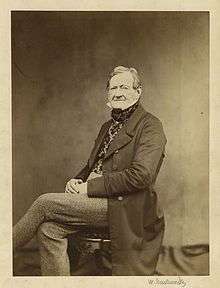 1860s albumen print portrait by Cundall, Downes & Co | |
| Born |
1 April 1786 Ennis, County Clare, Ireland |
| Died |
7 July 1863 (aged 77) Bayswater, London, England |
| Nationality | Irish |
William Mulready RA (1 April 1786 – 7 July 1863) was an Irish genre painter living in London. He is best known for his romanticizing depictions of rural scenes, and for creating Mulready stationery letter sheets, issued at the same time as the Penny Black postage stamp.[1]
Life and family
William Mulready was born in Ennis, County Clare. Early in his life, in 1792, the family moved to London, where he was able to get an education and was taught painting well enough so that he was accepted at the Royal Academy School at the age of fourteen.
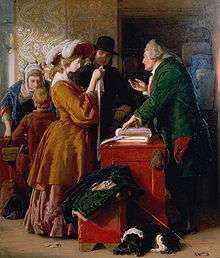
In 1802, he married Elizabeth Varley (1784–1864), a landscape painter. Their three children, Paul Augustus (1805–1864), William (1805–1878), and Michael (1807–1889) also became artists. His relationship with his wife however deteriorated gradually over the years, which is detailed in papers stored at the library of the Victoria and Albert Museum. His strong Catholic beliefs prevented any chance of a divorce but they separated. He accused her of "bad conduct" but shied from providing details. In a letter to him in 1827 she blamed him entirely for the collapse of their marriage, suggesting cruelty, pederastic activities and adultery were the reasons.[2][3]
His son, William Mulready Junior (1805–1878), lived in London and maintained a career of a portrait painter and picture restorer. He had five children (Ellen, Mary, Augustus Edwin, Henry William, and John[4]).They also were trained as artists, but not all of them pursued the artistic career: Henry William and John described themselves as 'house painters'.[5] Augustus Edwin Mulready (1844–1904) was the most successful of them and became known as a member of the Cranbrook Colony of artists.
Artistic career
Many of his early pictures show landscapes, before he started to build a reputation as a genre painter from 1808 on, painting mostly everyday scenes from rural life. Besides this, he also illustrated books, including the first edition of Charles and Mary Lamb's Tales from Shakespeare in 1807[6] and a poetry book for children by Catherine Ann Dorset. The book was very popular as it was a sequel to the The Butterfly's Ball, and the Grasshopper's Feast by William Roscoe.[7]
Mulready's paintings were popular in Victorian times. His first painting of importance, Returning from the Ale House, now in the Tate Gallery, London, under the title Fair Time, appeared in 1809.
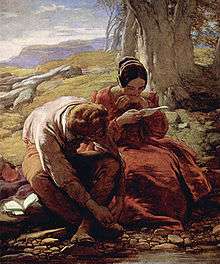
In 1815 he became an Associate of the Royal Academy (A.R.A.) and R.A. in 1816.[8] In the same year, he also was awarded the French "Légion d'honneur". Mulready's most important pictures are in the Victoria and Albert Museum and in the Tate Gallery. In the former are 33, among them Hampstead Heath (1806); Giving a Bite (1836); First Love (1839); The Sonnet (1839); Choosing the Wedding Gown (1846); and The Butt (Shooting a Cherry) (1848). In the latter are five, including a Snow Scene. In the National Gallery, Dublin, are Young Brother and The Toy Seller. His Wolf and the Lamb is in Royal possession.
In 1840, Mulready designed the illustrations for the postal stationery, known as Mulready stationery were introduced by the Royal Mail at the same time as the Penny Black in May 1840. They were issued in two forms; one variant was precut to a diamond or lozenge shape and folded to form an envelope that could be held together by seal at the apex of the topmost flap; and lettersheets that were cut in rectangles, folded over and sealed or tucked in.
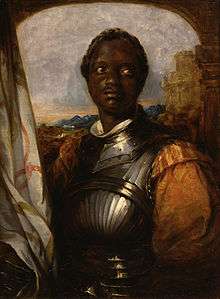
Stationery manufacturers, whose livelihood was threatened by the new lettersheet, produced many caricatures (or lampoons) of Mulready's design.[10] Only six days after their introduction, on May 12, Rowland Hill wrote that; I fear we shall have to substitute some other stamp for that design by Mulready ... the public have shown their disregard and even distaste for beauty, and within two months a decision had been made to replace the Mulready designed stationery. Essentially Mulready's designs were a folly.[11]
Death
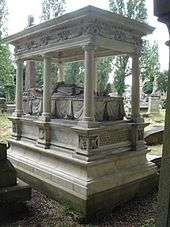
He died at the age of 77 in Bayswater, London and is buried[12] in the nearby Kensal Green Cemetery where a monument to his memory was erected. The monument lies on the north side of the main path, midway between the entrance and the main chapel, and although not in the front line of graves it is easily spotted due to its unique form. The tomb was designed by Godfrey Sykes.[13]
See also
References
- ↑
 "Mulready, William". Dictionary of National Biography. London: Smith, Elder & Co. 1885–1900.
"Mulready, William". Dictionary of National Biography. London: Smith, Elder & Co. 1885–1900. - ↑ Robinson, Leonard (2007). William Etty; The Life and Art. Jefferson, N.C.: McFarland. p. 354. ISBN 0-7864-2531-8.
- ↑ Brian Reade, Sexual Heretics, London, 1970. p. 16
- ↑ Censuses 1861, 1871, 1881
- ↑ Censuses 1871, 1881, 1891.
- ↑ Lamb, Charles (1807). Tales from Shakespear designed for the use of young persons. London: Thomas Hodgkins.
- ↑ Feldman, ed. by Paula R. (2000). British women poets of the Romantic era : an anthology (Johns Hopins pbk. ed.). Baltimore, Md. [u.a.]: Johns Hopkins Univ. Press. p. 226. ISBN 0801866405. Retrieved 11 October 2014.
- ↑ Melville, Fred J, Postage Stamps in the Making, p71, Stanley Gibbons, 1916.
- ↑ "Othello". The Walters Art Museum.
- ↑ "Mulready stationery: Caricatures". The Queen's Own: Stamps That Changed the World. National Postal Museum. Retrieved 2011-05-24.
- ↑ "Mulready Letter Sheets". Alphabetilately. Retrieved 2011-05-24.
- ↑ "Mulready, William".
- ↑ "Tomb of William Mulready, by Godfrey Sykes, Kensal Green Cemetery, London".
Publications
- Stephens, Memorials of Mulready (London, 1867)
External links
-
 Media related to William Mulready at Wikimedia Commons
Media related to William Mulready at Wikimedia Commons - William Mulready
Artistic
- County Clare Library Famous Artist Born in Ennis
- Emory University's Shakespeare Illustrated Mulready's Seven Ages of Man
- National Portrait Gallery, London Portraits of, and by, William Mulready
- Tate Collection, UK Works by William Mulready
- Profile on Royal Academy of Arts Collections
Philatelic
- 1d Mulready Letter Sheet, 2d Mulready Letter Sheet
- Mulready Stationery Envelopes, Letter Sheets, Parodies and Exhibit Pages
- National Postal Museum, Washington, D.C. Stamps That Changed the World
Other
- Kensal Green Cemetery Tour Find the Mulready Tomb
-
 Beach, Chandler B., ed. (1914). "Mulready, William". The New Student's Reference Work. Chicago: F. E. Compton and Co.
Beach, Chandler B., ed. (1914). "Mulready, William". The New Student's Reference Work. Chicago: F. E. Compton and Co.